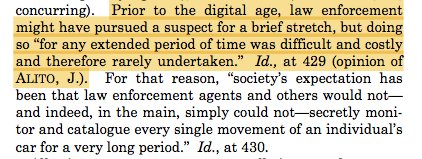Okay, I promised myself I would read the majority opinion in #Carpenter twice before tweeting, but after gleaning the general Twitter-sphere response, I wanted to sound a note that I haven't seen sounded enough:
This will be seen as an inflection point in the history of the Fourth Amendment. We'll be talking about 4A law before-Carpenter and after-Carpenter for a long time, at least for cases involving technology.
Carpenter is a major victory for privacy rights in this country. It's not just the holding, which is significant, it is the Chief Justice's opinion, which embraces more than a few theories of digital privacy that until now has not commanded a majority of the court.
So to all my friends who are seeing the dark lining in this immense silver cloud--who are saying, "why did they punt on this?" or "what if the dissents gain a fifth justice some day?"--I say: the privacy provided by Carpenter will expand more than contract from here. Celebrate!
• • •
Missing some Tweet in this thread? You can try to
force a refresh








